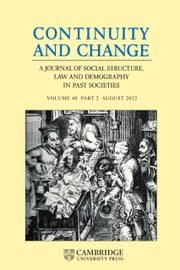Article contents
Sharecropping and livestock specialization in France, 1830–1930
Published online by Cambridge University Press: 02 October 2006
Abstract
Historians of sharecropping in France have usually emphasized its negative effects on growth and on the workers' welfare. However, from about 1840 the regions of central and western France, regions where sharecroppers were especially numerous, were also areas that saw great improvements and the specialization in commercial livestock. As the author shows, landowners from these areas used sharecropping contracts in order both to seize the opportunities given by the potential scale economies in livestock rearing and to take advantage of family labour at a time of increasing wages. After presenting some basic data regarding sharecropping contracts, the second section is intended to describe the improvements in livestock farming in the area under sharecropping after 1840 and the contribution of landowners. Section III offers an explanation of why landowners preferred sharecropping to fixed-rent contracts. Three causes in particular are identified: (i) a lack of physical and human capital sufficient to allow potential farmers to engage in large scale farming; (ii) the contribution of landlord managerial expertise; and (iii) the fact that the complexity of mixed farming required a quality of work that would have been too expensive with wage labour. In a final section the ways in which the success of sharecropping minimized transaction costs are discussed.
- Type
- Research Article
- Information
- Copyright
- 2006 Cambridge University Press
- 8
- Cited by




